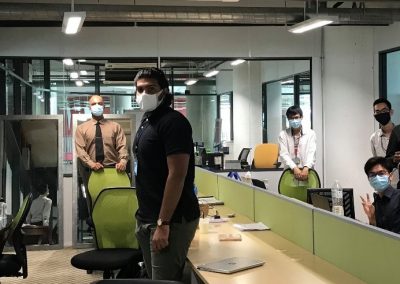ASBX Start-up Internship Programme


Introduction
The ASBX Start-up Internship Programme is developed to provide internship opportunities to students who are interested to explore entrepreneurship opportunities and/or to develop their innovative ideas into commercially viable businesses. Students who go through the programme will also develop a strategic mindset in managing their day-to-day work assignments in an innovative and creative manner.
Vision
To transform APU students into innovative and driven achievers with an entrepreneurial mindset.
Mission
To inspire and motivate APU students to explore on their start-up journey and to develop their innovative ideas into commercially viable businesses.
Aim
The ASBX Start-up Internship programme aims to enable students to gain start-up and entrepreneurship experience, enabling them to develop their own start-up as an alternative to employment. Students will be able to acquire the relevant content, learn from mentors’ support, and experience practical exposure to develop the skills required for establishing and running a start-up company. The ASBX start-up internship is an alternative to industrial training, and internship is a key component of learning in an integrated academic curriculum.
Learning Outcomes
Upon successful completion of the ASBX Start-up Internship programme, you will achieve the following learning outcomes:
-
- Understand how an innovative idea can be taken into the market using effectuation, design thinking and venture building concepts
- Acquire a range of technical and non-technical knowledge required in the start-up environment
- Develop effective personal and communication skills required to better manage people, project, time, and business/company
- Improve writing, analytical, and critical thinking skills
- Able to relate the practical learning experience to a future career and/or business plans.
Additional learning outcomes for engineering or technical students include the abilities to:
-
- Develop an innovative idea and/or identify a technological gap required to solve an industry problem
- Evaluate suitable and effective tools and techniques to solve complex engineering or technology related problems
- Apply technical knowledge and skills to the business context
- Apply engineering practices to safety, health, social, cultural, and legal responsibilities in developing solutions for complex engineering problems
- Synthesize the knowledge obtained in the classroom to apply to a real-world environment
- Practise professionalism in a start-up environment under supervision
- Apply the experiences in a start-up environment in relation to your area of study.
ASBX Start-up Internship period
- This is a 16-week start-up experience incorporated as part of the industrial experience programme for students to explore and develop their innovative ideas into business interests.
- In compliance with the Malaysian Qualifications Agency and/or professional bodies’ requirements, the industrial experience will be offered during the third Semester of Year 2 for most programmes, except for engineering students in third Semester of Year 3.
Objectives of ASBX Start-up Internship placement
- Development of Interpersonal and social skills –
- This objective aims at enabling students to appreciate the importance of building human relations. This includes the ability to integrate with a team of mentors, other business connections, peers, and subordinates, especially in organising work and exercising responsibility over them. Communication skills also play an important role, including the ability to act tactfully, to present a case clearly, and to interpret the needs of others, whether articulated or implied.
- Insights into the world of start-up and entrepreneurship –
- This aims to provide an understanding of the ‘world of work’ and start-up as an alternative to employment. This includes understanding the fundamental skill sets for a start-up, and the concepts of effectuation, design thinking, and venture building. An understanding of the start-up processes, realities of a start-up life, and how the real-world works is important too.
- Interrelationships of theory and practice –
- This objective aims at relating theory to practice and describes how a placement can offer practical experience with the application of theoretical concepts. Students will apply the theory and academic knowledge at the practical level and are offered a context within which to integrate the practical and theoretical parts of an academic course. Typically, the placement offers an experience in a working environment in which students are given the opportunity to apply what they have learned from the previous semesters. During placement, students will be able to practise their knowledge and skills within the start-up environment.
- Personal development –
- This objective aims at developing personal attributes such as self-confidence, maturity, and self-reliance in students. Students will be able to develop the abilities required as leaders, to accept responsibility, to work effectively, especially under stress, and to build on previous knowledge and experience for personal development.
- Additional and indirect benefits of placements –
- Students can gain other benefits from the start-up experience compared to those who are placed immediately after an internship programme. Such benefits include opportunities to continue with his/her start-up company upon graduation or during his/her study, course appraisal and review, informed selection of course options, and project idea(s) for his/her final year project. A placement can provide fresh ideas, new experiences, and an exposure to relevant industrial contacts/linkages.
- Career preparation –
- This objective is aimed at preparing students to consider start-up as an alternative to their career development. Students will be equipped with knowledge on how to develop new business ideas, run a business/company, and insights into different careers and opportunities.
- Technical development –
- This objective aims at developing the technical knowledge and expertise for undertaking day-to-day tasks. This includes perceiving the needs of a task accurately and knowing how to extract information quickly and effectively to complete the task at hand.
For further enquiries, please contact Dr. Beh at beh.chingyew@apu.edu.my








